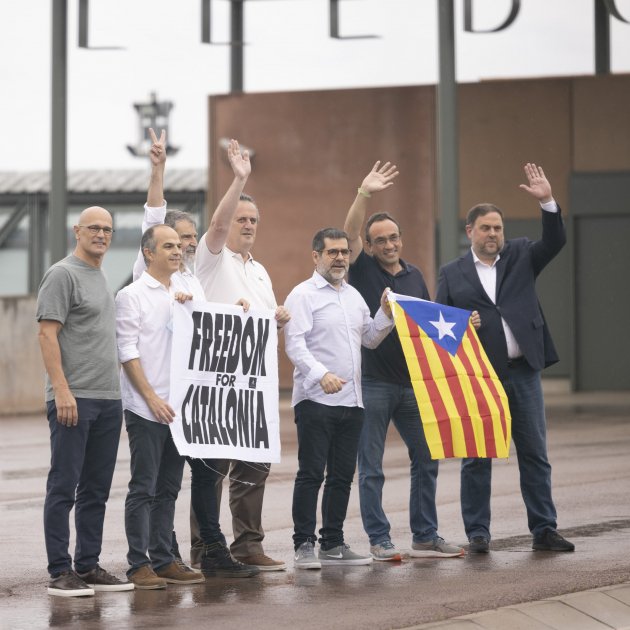A change of Spanish judges has brought a change in Spanish justice. In this case, the parties affected are the nine imprisoned Catalan pro-independence leaders, convicted to long jail sentences for sedition in 2019 and partially pardoned last year, allowing them to leave jail. The Supreme Court has now decided to change the criteria used so far and review the granting of pardons to the nine Catalan political prisoners.
The pardons were the result of a decision of the Pedro Sánchez government: on June 23rd, 2021, Oriol Junqueras, Carme Forcadell, Jordi Sànchez, Joaquim Forn, Raül Romeva, Jordi Cuixart, Dolors Bassa, Josep Rull and Jordi Turull, ended their imprisoned after the Spanish executive decided to overturn their jail sentences.
But this Tuesday, the administrative disputes chamber of the Supreme Court has agreed to consider the appeals for reversal of the pardons filed by the plaintiffs - political parties the PP, Vox, Ciudadanos and the association Catalan Civic Coexistence - against the decision of this same court to reject their legitimacy to appeal the measures of clemency granted by the government of Pedro Sánchez.
As the Supreme Court said in a statement, "the chamber has decided by a majority of 3 to 2 to consider the appeals for reversal filed against the actions of the chamber" that refused to admit the early appeals against the pardon decision. "The court upheld all appeals, except for the one filed by the Pro Patrimonium Sijena and Jerusalem [association], which was unanimously rejected."
Change in court composition
This decision is contrary to the previous one made by the Supreme Court itself. In its initial decision, in January this year, the same administrative disputes section of the court rejected, also by 3 votes to 2, all appeals, both by individuals and parties (PP, Vox and Cs) against the pardons, considering that they were not empowered to take such legal action due to a lack of a legitimate interest.
The change of criterion now is not a coincidence, but rather comes after several personnel changes at the Supreme Court. Specifically, in this administrative disputes chamber, with the replacement of Ángeles Huet, the reporting judge for the ruling which rejected the appeals, while the person who broke the tied vote, the president of the chamber, Segundo Menéndez, retired. Huet was replaced by magistrate Inés Huerta, who has a different approach to Huet. Thus the one-vote majority has become a one-vote deficit.
Arrimadas: "Victory against the coup plotters"
The first to celebrate the announcement on Twitter was Ciudadanos leader, Inés Arrimadas: "Great news, the Supreme Court accepts our appeal against the ignominious pardons to the coup plotters of the process. How he hope that the victory will become complete and we will achieve the annulment of this unthinkable manoeuvre by the Sánchez government." In fact, Cs has so far been the most active of the parties of the Spanish right in expressing its contentedness at this change of mind by the Supreme Court.
A dangerous precedent
However, the court decision also sets a precedent in stepping away from current jurisprudence which de facto shielded the decisions of the Spanish government when granting pardons.
Until now, the right of pardon has been accepted as representing an extraordinary power of interference by the executive branch in the area of competence of another branch, the judiciary, the only such exception that exists, defined by the constitution, and by law, to the exclusive and exclusionary function which justice has of the power to judge and enforce what has been judged, in accordance with Article 117 of the Spanish Constitution and Article 1.2 of the Organic Law of the Judiciary.
The exercise of the power of pardon is only exceptionally justified and as a remedy for situations considered of notorious injustice, to refer to those cases in which the execution of the sentence would no longer fulfill the function of resocialization that was constitutionally entrusted. But it should be remembered that dozens of people are pardoned every year, and the application of this provision to the leaders of the 2017 independence process was by no means a rarity.
In any case, the change in the criteria of the Supreme Court on admitting the appeals does not ensure that they will end up being successful, but rather only allows them to advance in the judicial process - for the moment, one step further. It also makes it likely that the issue will come to back to life among some sections of the public due to media coverage.
